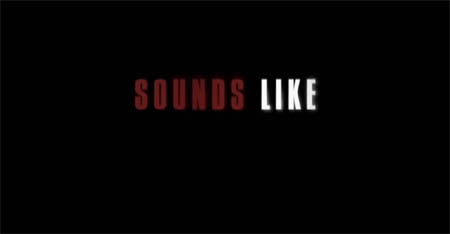
BUY IT AT AMAZON: CLICK HERE!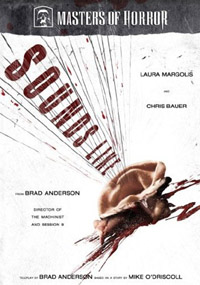
STUDIO: Anchor Bay
MSRP: $14.98
RATED: NR
SPECIAL FEATURES:
· Aural Madness: The Making of Sounds Like
· A Cacophony of Sounds Like: A Look Behind the Special Effects
· Audio Commentary with writer/director Brad Anderson
· Photo Gallery and Screenplay
The Pitch
A call center manager goes buggy after he loses his son and his ears develop super human hearing abilities.
The Humans
Written and Directed by Brad Anderson. Starring Chris Bauer and Laura Margolis.
The Nutshell
Larry Pearce (Craig Bauer, The Wire and Third Watch) can hear everything times eleven. From big drops of rain on his windshield to baby mice in the crawl space, every little sound is amplified to a torturous degree. How he gained such an incredible power is unclear, but before his son died, Larry was thankful for his gift. It came in handy as a call-center manager, in which he was paid to essentially spy on a room full of IT guys, terminating any call that stay out of the realm of helpful service. Larry is so good at his job he can hear someone using instant messenger with the sound turned off. But after the death of his son, Larry’s gift quickly turns into a horrible curse. Every sound, from his wife knitting a new baby sweater to the fish swimming in his aquarium, burdens him with the reminders of life. What lengths will he go to silence them all forever and finally achieve a peaceful noise-free existence?
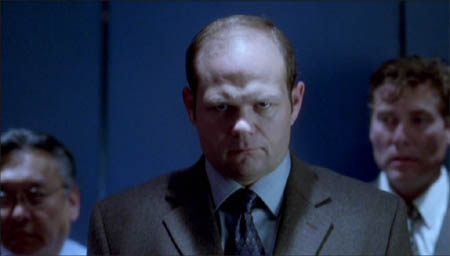
Moments later, Tom regretted doing his version of the Stanley Kubric gaze when the elevator door opened on his highly attractive boss.
The Lowdown
I wouldn’t call Brad Anderson a Master of Horror, but he sure is an interesting young writer/director. The former Boston-based filmmaker’s debut feature was a light indie comedy (Next Stop Wonderland) but his career shifted with Session 9, a creepy, atmospheric spook show set in an abandoned asylum. From then on, Anderson’s work (including The Machinist, a film I don’t like and simultaneously admire) have been preoccupied with grief and how people deal with guilt.
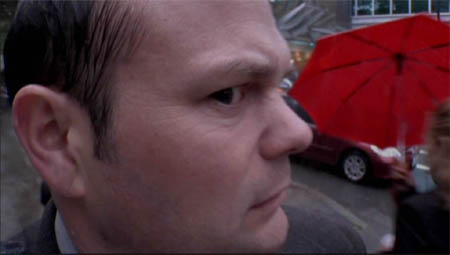
"Overly directed shot? Obvious use of the color red? Shit. I’m in a Shaymalan movie."
Sounds Like continues that theme, and Anderson picks a remarkably apt metaphor for the survival guilt Larry Pearce is going through. Overwhelmed by the death of his son, Larry simply refuses to let go of the pain and tries to go about his life just as it was before. But the world keeps moving past him; his wife wants a new child, his boss is demanding more from him at work, his neighbors want him over for dinner, and all Larry can think about doing is maintaining some kind of silence, staying in the last peaceful moment he can remember, standing at a pond with his son, sailing a toy ship.
That moment’s also happens to be Larry’s decline, as it’s the same scene in which he hears his son’s heart deteriorating (victim of some made-up movie disease). And if all of this sounds like a bad Stephen King story adapted for TV, well…it does sound like that. But thankfully, it’s more like a pretty good Stephen King short story adapted well for television (has that ever happened?), thanks to sharp writing and direction from Anderson and a solid performance from Bauer. Rather than being playfully overt about his survival guilt subtext, Anderson makes smart, thoughtful statements without calling a lot of attention to them. Take for example the scene where Larry visits his son’s grave. He places a toy ship on the stone and his ears immediately start ringing from an incessant flapping sound (like giant wings of a bat). Searching everywhere in the area for the cause of this disruption, Larry finally comes upon a miniature American Flag, flapping like mad in the light breeze over someone else’s grave. Larry crushes the flag with his foot, silencing it forever.

Hungry-Hungry-Blind Baby Mice was never a big seller for Hasbro.
And that allusion to post 9/11 survival guilt is about as political as it gets, which is refreshing after the allegory overload of fellow Masters of Horror episode The Washingtonians. Anderson is more interested in character and how the human mind deals with intense feelings of guilt and grief. Rather then moving on with his life, Larry becomes obsessed with maintaining silence and stillness, (representing death, and his son) and every little thing that makes a sound reminds him that life is continuing to happen all around him. The possibilities of driving this material towards cheesy clichés and derivative dead-ends are everywhere here, but Anderson consistently makes the right choices. Another later scene at his son’s grave (after Larry’s hearing goes into overload) is a fine example of this. Larry finally thinks he’s finally reached a peaceful place and rests his head on his son’s grave. But then he hears something. And just when I thought the film was going to slide off into a horror movie cliché, it surprised me with something natural and much more frightening and haunting. Themes and ideas progress naturally in this episode, and while the ending might not be that shocking to trained viewers, the way the finale is executed is haunting and creepy.
My one complaint is that Larry comes off too crazy too soon. If some of the writing early in the script painted him as a guy who flirted with the possibility of moving on with his life rather then being stubborn from the get-go, his downfall would feel far more tragic and heartbreaking. I would have liked him to be a tad more sympathetic protagonist early on, but I can’t deny that I was genuinely surprised at how good Sounds Like sounded like.
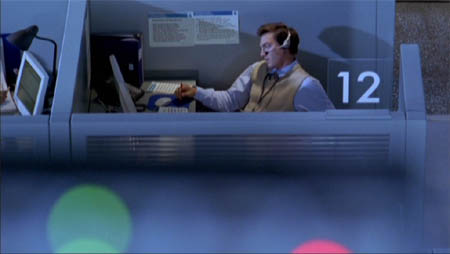
"All right, Big Bird, keep your feathers on. We’ll sponsor you one last time. But it’s just 12, hear me? No mention of that letter C or number 5. We get exclusive rights. And pay your bill or we’ll break Snuffy’s knee-caps and send him to see Mr. Hooper."
The Package
While I don’t like the cover art as much as I did for The Washingtonians, the episode is far superior and the extras are just as good. The behind-the-scenes shorts explain just how professional and specific Anderson is as a filmmaker. He takes his work seriously and it shows. The commentary from Anderson is solid; even if he sounds a bit pissed off all the time (I think that’s just how he talks). The sound (which is crucial) is excellent throughout the film, and even the music (Anton Sanko) is effective. All in all, it’s a good package for a one hour Showtime episode.